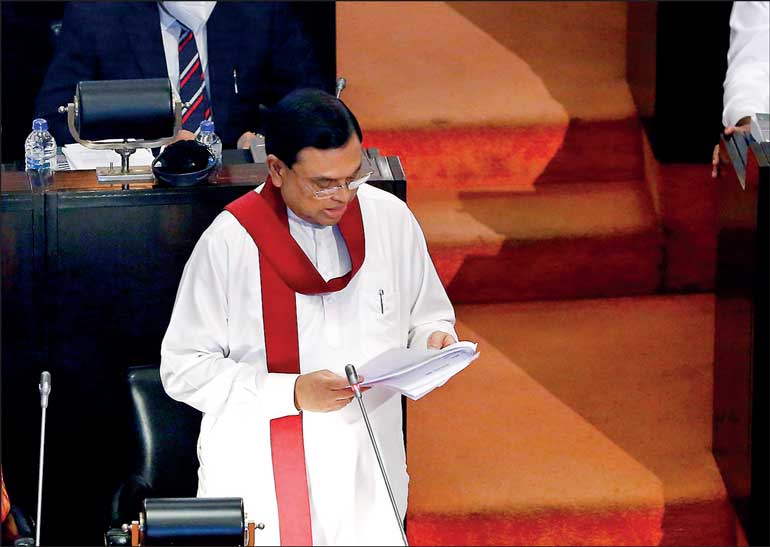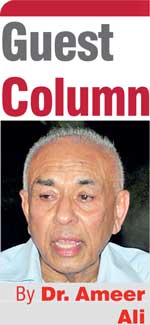Saturday Feb 14, 2026
Saturday Feb 14, 2026
Wednesday, 17 November 2021 00:00 - - {{hitsCtrl.values.hits}}

One should sympathise with Finance Minister Basil Rajapaksa for presenting a Budget under very challenging circumstances, but much of those challenges are the regime’s own making
 “Futuristic and people-centric” and “non-traditional” are the advertising captions given by Finance Minister Basil Rajapaksa to his maiden Budget for 2022.
“Futuristic and people-centric” and “non-traditional” are the advertising captions given by Finance Minister Basil Rajapaksa to his maiden Budget for 2022.
In fact, every budget is futuristic in the sense that a budget always speaks about intentions and means of realising them over a certain period in the future. What is so unique about this Budget’s future?
At the same time and as expected there is very little in it to ease the punishing economic pain suffered by practically every ordinary household in the country. A country never known for hunger and starvation in the past is in the thick of it at present. In that sense, the Budget is not people-centric.
It is also not non-traditional, because like its predecessors, this one continues along the path of deficit producing, and that too in trillions of rupees, 1.176 trillion to be exact. (Incidentally, how does an ordinary person comprehend the magnitude of this amount in physical term? Here is one way of explaining it: If one million = 1,000000 rupees worth of 1,000 rupees notes are stacked, the height would be around four inches. Based on that calculation, one trillion = 1,000,000,000,000 worth of 1,000 rupees notes would have the height of 63 miles or nearly 12.5 times the height of Mount Everest).
However, in couching the Budget proposals within the national policy framework of ‘Vistas of Prosperity and Splendour,’ Basil’s Budget is ideology-centric without admitting its un-achievability, at least in the life span of the current regime.
Before looking into the specifics of the Budget, it is totally hypocritical for the Minister to quote Mahagamasekera who summoned together, “Dharme, Cassim (and) Rajasundaram” to “make this world a better place than it is now,” when Basil himself is part of a regime that is bent on keeping them apart so that Rajapaksas could divide and rule.
Without the Minister realising it, this quote is a tacit admission of a hard truth, i.e., the real and long-term solution to Sri Lanka’s economic malaise lies more in the arena of socio-politics than in economics itself.
Over the last 70 years or more, it is the rotten socio-political foundation paved by ethno-religious nationalism that prevented the transformation of fertile Sri Lanka into an economic powerhouse like Singapore. Basil’s Budget, like all other previous budgets, is not going to free this economy from its malignancy. It is therefore a traditional budget, rich in promises and dreamy but poor in how and whys.
The deficit amounts to nearly one and three quarters of a trillion rupees. How will this Budget finance this deficit without borrowing more and adding to an already-bourgeoning national debt with increasing risk of debt default?
With international credit rating agencies downgrading Sri Lanka’s credit worthiness, borrowing is going to be costly. Currency swaps and loans from friendly countries and neighbours are palliative measures, which may carry some hidden costs unrevealed to the public.
The Government seems to be betting too much on the expected financial bonanza from the Chinese Port City in Colombo, oil and gas exploration in the Mannar basin and from Foreign Direct Investments. These are birds in the bush. Even now it is not too late for Basil and Cabraal to go with this Budget to the IMF for help, but the threat of surrendering to IMF conditions, though painful in the short-term but healthy in long-term, would be politically unpalatable to the regime.
The Minister hopes to increase Government revenue by improving tax administration. This is a perennial issue in Sri Lanka where tax assessors act as unofficial tax advisers to private firms and individuals. There are unwarranted and illegal leakages from the circular flow which deprive Government of its revenue. What more evidence to this loophole does the public need than the Pandora Papers with Rajapaksa names in them? Without cleansing tax administration of corruption, there is not much hope to raise revenue from this source.
There is also an entertaining aspect in Basil’s revenue proposals. One of them is the tax on traffic accidents. The Minister hopes to reduce accidents by taxing them. What a joke? If he is serious about reducing the number of accidents, which are of course too many, he should tackle the problem more directly by way of for example, widening existing roads, improving traffic rules, removing un-roadworthy vehicles from operation and more importantly, by providing cheaper and safer alternative modes of public transport.
Instead, his proposal to tax is analogous to how governments in the past increased tax on cigarettes by arguing to reduce cancer from smoking until public pressure made them take direct action against tobacco industry.
On the expenditure side, the lion’s share has gone once again to defence, with Rs. 373 billion or nearly 10% of total expenditure. What is the rationale to spend on this white elephant when, according to one Minister, there is no threat to security either from inside or outside the country? The answer is obvious. When discontent against the regime grows into open confrontation, the military would be the last resort to save the rulers. Hence, defence personnel should be kept pampered all the time.
The second largest allocation has gone to the public service, mostly to sustain an army of unemployable graduates. This is the result of the wrong type of education imparted in swabasha, the products of which have no place to find employment in the private sector.
Overstaffing public administration is now biting the Treasury and there are no suggestions to prune its size. No wonder the Government is encouraging this crowd to migrate to foreign countries in search of any job. The solution to the problem lies in improving education to make it skill-oriented and marketable. But education has received only 185 billion of which 30 billion would go to settle the teachers’ salary issue.
Another chunk of Budget allocation, 250 billion, goes to the Highways Department. The argument is that they are necessary for economic development. But why should farmers, carters and cyclists pay for these ultra-modern autobahns, which they are not allowed to use? The reality is something else. These infrastructure constructions offer plenty of opportunities to earn percentages to minsters and their sidekicks from contracts and subcontracts. Larger the allocation, greater the opportunities for them.
One should sympathise with the Minister for presenting a Budget under very challenging circumstances. But much of those challenges are the regime’s own making. As mentioned at the beginning, the long-term solution to the economic crisis lies in earning surpluses both in balance of payments as well as in domestic budget.
Removing the twin deficit and converting them into surpluses requires a national effort. That cannot be achieved unless the socio-political foundation on which the economy rests is altered. It should be rebuilt to make it inclusive of all communities and not exclusive to only one. In other words, the real solution to the economic crisis lies outside economics.
(The writer is attached to the School of Business & Governance, Murdoch University, Western Australia.)